Edition: 22 April to 3 May 2024
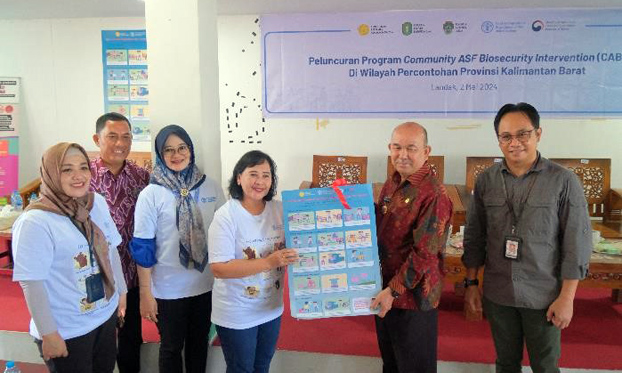 ©FAO/Alia Dwirahmani | INDONESIA Launch of Community African swine fever Biosecurity Intervention programme in West Kalimantan On 30 April and 2 May 2024, the Indonesian Ministry of Agriculture (MoA) and FAO, with support from the Ministry of Agriculture, Food and Rural Affairs (MAFRA) of the Republic of Korea (ROK), launched the Community African swine fever (ASF) Biosecurity Intervention (CABI) programme in Pontianak City and Landak Regency, West Kalimantan. Following the successful implementation in North Sulawesi, the programme now aids 84 local farmers with ASF risk education, biosecurity knowledge and essential equipment to help them implement biosecurity measures in their farms. Rajendra Aryal, FAO Representative in Indonesia and Timor Leste emphasized the importance of collaborative efforts to prevent ASF. Read more here. |
Learn more about our work on ASF here.
| |
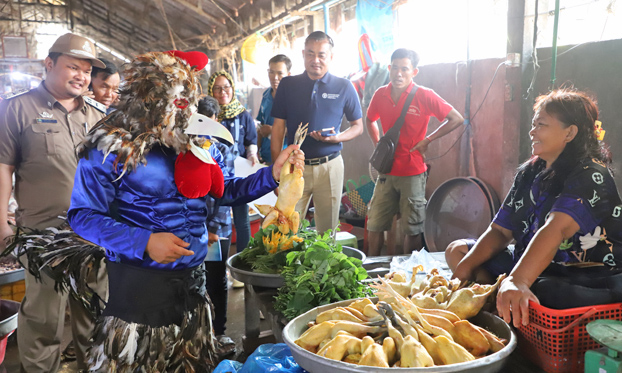 ©FAO/Siheng Ngon | CAMBODIA Avian influenza prevention campaign launched FAO, in collaboration with the Department of Technical Extension and Legislation of the General Directorate of Animal Health and Production (GDAHP) and local authorities, has launched a campaign in Cambodia to control and prevent avian influenza. The initiatie, supported by United States Agency for International Development (USAID), focuses on raising public awareness in communities and live bird markets, particularly around the Khmer New Year—where people usually cook chickens, ducks or any kind of bird for food—and other festivals. The campaign will be rolled out in Takeo and Kampot provinces and other provinces nationwide. |
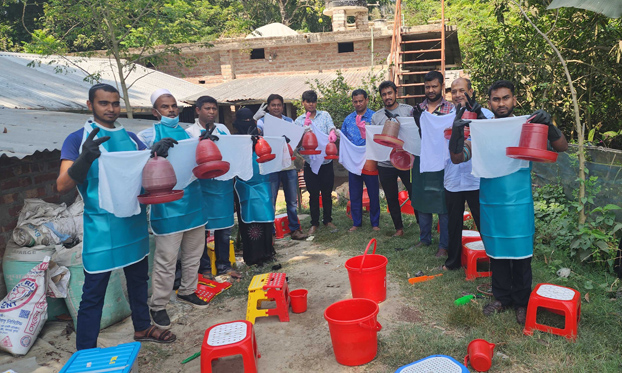 ©FAO/Humayra Nowrin | BANGLADESH Training for model poultry farms FAO, in partnership with the Department of Livestock Services (DLS) and funded by USAID, organized a three-day training for poultry farmers in Sylhet, Jessore and Munshiganj. As part of the Upazila to Community (U2C) initiative, the training designed to improve farm management skills, emphasizing biosecurity and antimicrobial resistance/usage, ensuring safe food production. |
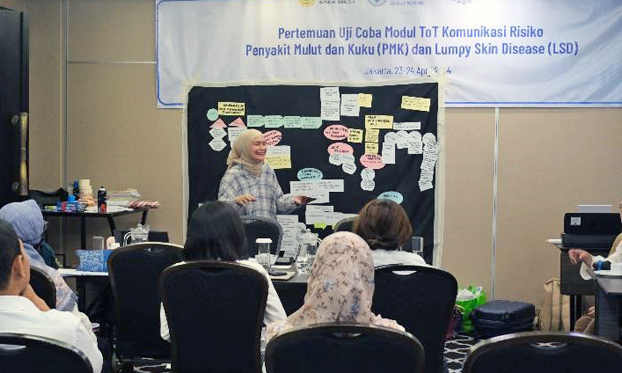 ©FAO/Alia Dwirahmani | INDONESIA Dry run of FMD and LSD risk communication training module In collaboration with Jalin Foundation and supported by the Australian Government, MoA and FAO conducted a dry run of FMD and LSD risk communication training modules in Jakarta from 23 to 24 April 2024. This session provided MoA staff with guidance to facilitate training of trainers (ToT) for subnational government officers. Inputs was gathered to improve the module, which will be used for training activities in May and June. |
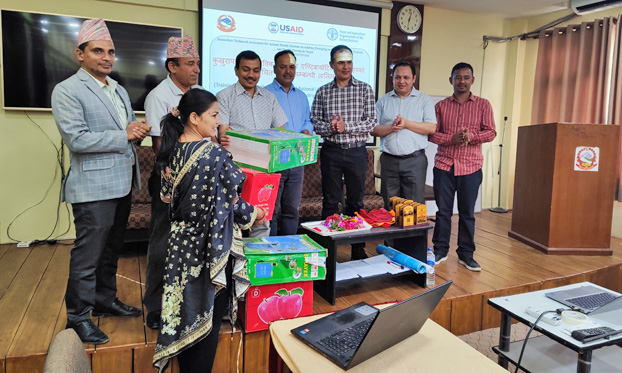 ©FAO/Surendra Karki | NEPAL Farmers’ training in three districts FAO, Department of Livestock Services and partners, through USAID funding, conducted three training sessions on biosecurity and rational use of antibiotics for pig and poultry farmers in Lamjung (21-22 April), Tanahun (25-26 April) and Buditola (2-3 May). In total 66 smallholder farmers, farm workers and animal health technicians participated, enhancing their biosecurity practices and awareness of antimicrobial resistance. Participants received farm disinfection kits and personal protective equipment. The training was held in collaboration with the Department of Livestock Services and Veterinary Hospital and Livestock Expert Service Centre in both districts. |
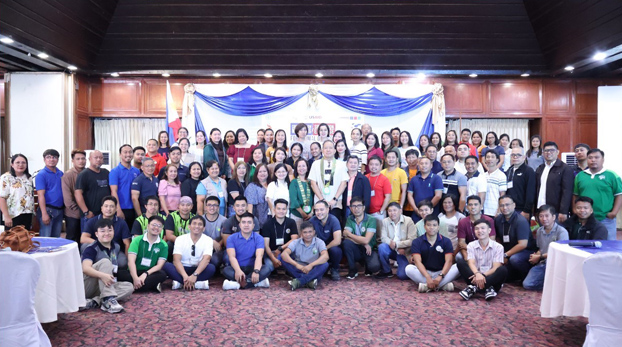 ©FAO/Roxanne Bunayog | THE PHILIPPINES Coordination meeting and simulation exercise for animal disease emergencies Funded by USAID, FAO and BAI organized a coordination meeting and simulation exercise for animal disease in Laoag City, Ilocos Norte. This workshop focused on avian influenza and FMD, aiming to build capacities of veterinarians, agriculturists, quarantine officers and laboratory analysts. The meeting also provided training on early disease warnings and immediate response actions. |
Learn more about our work on risk reduction along the value chain here.
| |
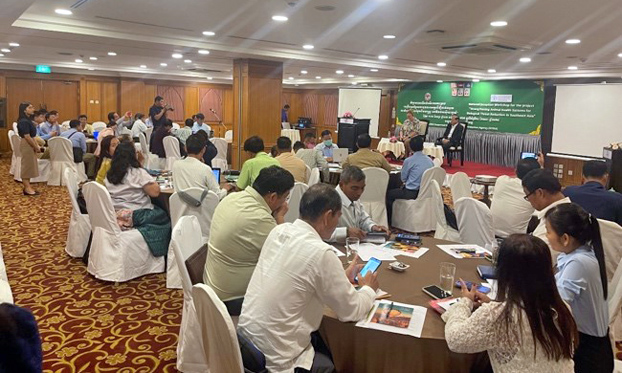 ©FAO/Joy Masongsong | ASIA AND THE PACIFIC, CAMBODIA, LAO PEOPLE’S DEMOCRATIC REPUBLIC AND THE PHILIPPINES Launch of the FAO-DTRA project to strengthen animal health systems in three countries in Southeast Asia
FAO and the Defense Threat Reduction Agency (DTRA) launched the national activities of the Strengthening Animal Health Systems for Biological Threat Reduction project in the Philippines (10 April), Cambodia (24 April) and Lao People’s Democratic Republic (3 May). This regional initiative aims to mitigate biothreat risks and impacts. Coordinated with national authorities and partners, the project kickoffs presented objectives and workplans, facilitating discussions to ensure alignment and synergy with national animal health programmes. Over the next three years, FAO and local stakeholders will have the opportunity to work even closer to enhance animal health systems and improve pandemic preparedness through strengthened epidemiological and laboratory capacities and networks. |
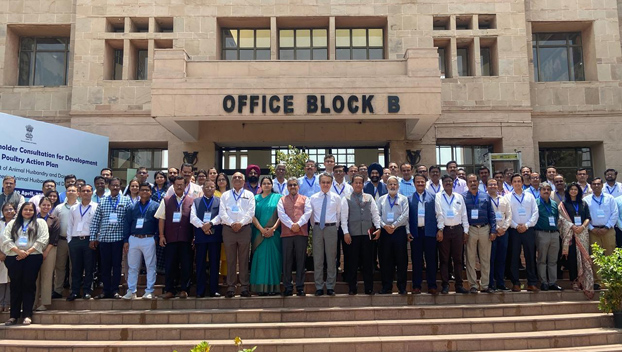 ©FAO/Vikram Vashisht | INDIA Expert consultation on advancing India’s poultry health On 29 April 2024, the FAO Representative India Takayuki Hagiwara and the FAO team joined a two-day expert consultation to develop India’s poultry action plan. Organized by the Department of Animal Husbandry and Dairying, the meeting gathered policymakers, researchers, scientists, poultry associations and industry representatives. FAO-R India reaffirmed FAO’s dedication to supporting the government, amid evolving evolving health threats such as avian influenza in dairy cattle. The workshop focused on finalizing the revised avian influenza action plan, including updated compensation rates for affected poultry and exploring the use of low pathogenic avian influenza vaccination in India. |
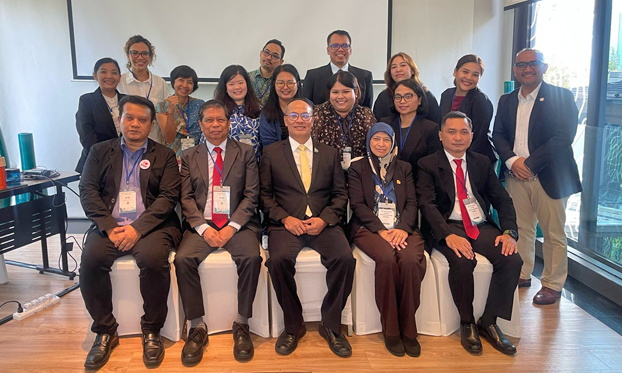 ©FAO/Maharti Rihana | ASIA AND THE PACIFIC Southeast Asia livestock communication workshop From 23 to 25 April 2024, FAO organized the Southeast Asia livestock communication workshop in Phuket, Thailand, hosted by the government of Thailand and funded by the Australian Government through the Department of Foreign Affairs and Trade (DFAT). The workshop, which comprised of five leading countries in the cooperation of livestock communication in ASEAN (Indonesia, Malaysia, the Philippines, Singapore and Thailand), aimed to support the ASEAN Member States in strengthening communication and advocacy on animal health and zoonoses within ASEAN. Discussion focused on harmonizing efforts and integrating animal health information sharing in the region. |
 ©FAO/Kachen Wongsathapornchai | ASIA AND THE PACIFIC Chulalongkorn University Veterinary Conference 2024 On 24 April 2024, FAO ECTAD Regional Manager Kachen Wongsathapornchai presented and moderated a panel discussion on One Health and the 2030 Agenda on Sustainable Development at the Chulalongkorn University Veterinary Conference. Participants included veterinary students, faculty members, veterinary professionals, representatives from veterinary faculties in Thailand, associations and government. The event was opened by the Minister of Agriculture and Cooperatives and the President of Chulalongkorn University. |
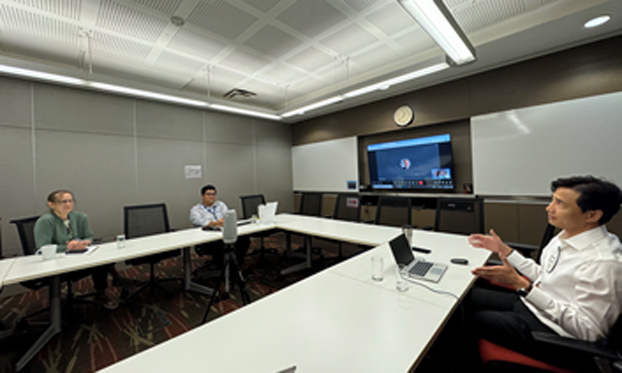 ©FAO/Kachen Wongsathapornchai | ASIA AND THE PACIFIC FAO coordination meeting with USAID Regional Development Mission FAO attended the one-on-one FAO-USAID discussion organized by the USAID Regional Development Mission (RDMA). The discussions included the background of USAID’s support to FAO ECTAD Regional Office for Asia and the Pacific, updates on ongoing initiatives and the development of the 2025 workplan. They also discussed priority areas of interest identified at the USAID partners workshop last March. |
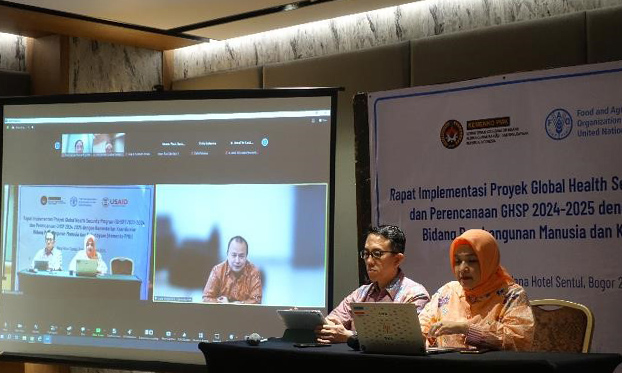 ©FAO/Satwika Movementi | INDONESIA Global Health Security Program work planning meeting with the Coordinating Ministry of Human Development and Cultural Affairs The Indonesian Coordinating Ministry of Human Development and Cultural Affairs (CMHDCA), together with FAO and USAID, held a work planning meeting for the Global Health Security Program (GHSP) in Bogor, Indonesia from 25 to 26 April 2024. The meeting, opened by the CMHDCA Executive Secretary, expressed CMHDCA's commitment to strengthening health security against zoonotic diseases and emerging infectious diseases. Discussions led to adjustments in 2024 targets and work plan, project document, activities, and timelines, which initially developed in November 2023. |
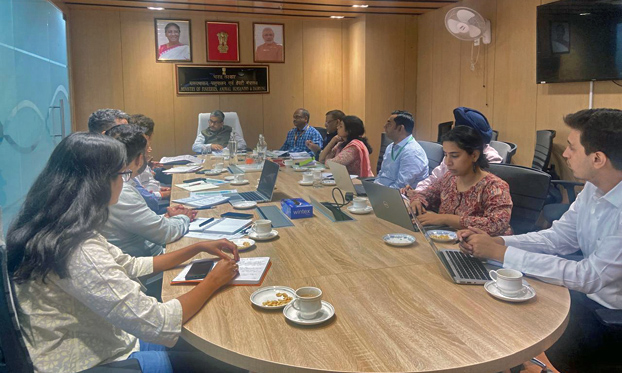 ©FAO/Bushra Owaisy | INDIA Discussing the Pandemic Fund launch On 23 April 2024, FAO, the World Bank and Asian Development Bank met with the Animal Husbandry Commissioner Dr Abhijit Mitra to discuss launching the Pandemic Fund project to enhance India’s pandemic preparedness. The event is scheduled for 6 July 2024, on World Zoonoses Day and will be organized by the Department of Animal Husbandry and Dairying. It will host 250-300 participants, including cabinet ministers, state ministers and relevant partners and stakeholders. |
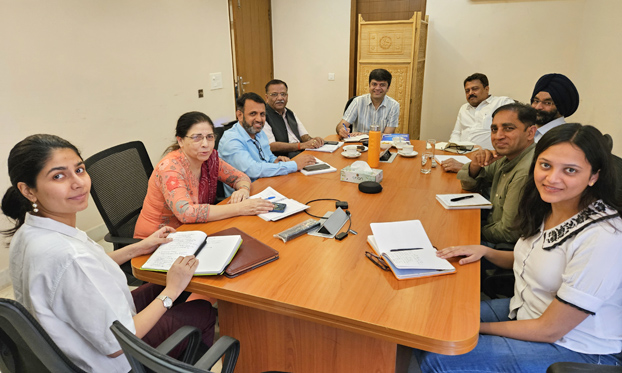 ©FAO/Bushra Owaisy | INDIA Review and revision of FAO activities supported by USAID On 1 May 2024, USAID GHSP focal point Dr Bhavin Vadera visited FAO to review ongoing activities and plan for 2025. Dr Vadera was briefed on past activities of AMR and zoonoses and encouraged further collaboration with stakeholders, including the private sector. Updates were provided on In Service Applied Veterinary Epidemiology Training (ISAVET), animal disease prioritization and developing standard veterinary treatment guidelines. Dr Vadera also sought information on Pandemic Fund activities to ensure no overlap with USAID-supported project. He appreciated the ongoing efforts and the publication of Indian Network for Fishery and Animal Antimicrobial Resistance (INFAAR) surveillance data. |
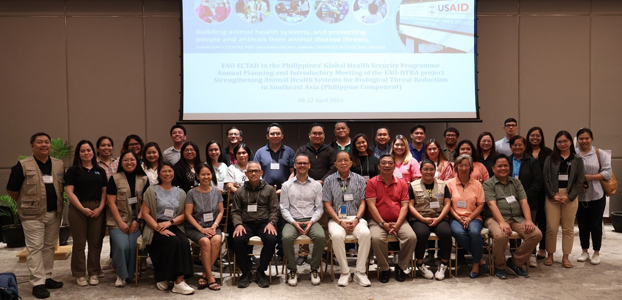 ©FAO/JRoxanne Bunayog | THE PHILIPPINES Stakeholders consultation and year three planning meeting FAO, through USAID funding, organized a stakeholders consultation and planning meeting in Tagaytay City from 8 to 12 April 2024. The meeting reviewed good practices for project implementation and aimed to improve collaboration with partner agencies and stakeholders. FAO presented updates and achievements of the GHSP over the past 1.5 years, highlighting current projects supported by different partners. The meeting also identified priority activities for addressing present and future health concerns. |
Learn more about our work on partnerships here.
| |
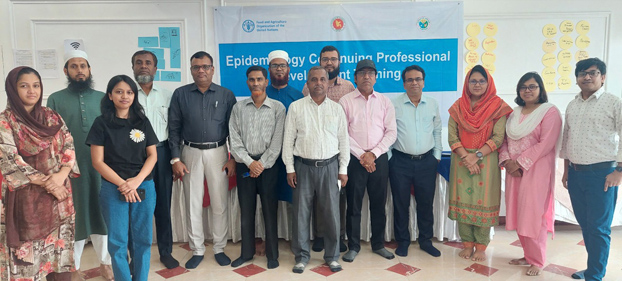 ©FAO/Humayra Nowrin | BANGLADESH Epidemiology training enhances government’s capabilities FAO conducted a six-day training from 22 to 27 April 2024 for officers from the epidemiology cell and public health within the DLS. This initiative aims to boost the department’s capacity in disease surveillance control, crucial for protecting animals and human health in Bangladesh. The training covered techniques in disease surveillance, outbreak investigation, infection prevention and control, utilizing modern epidemiological tools and methodologies for early detection and monitoring of livestock diseases. |
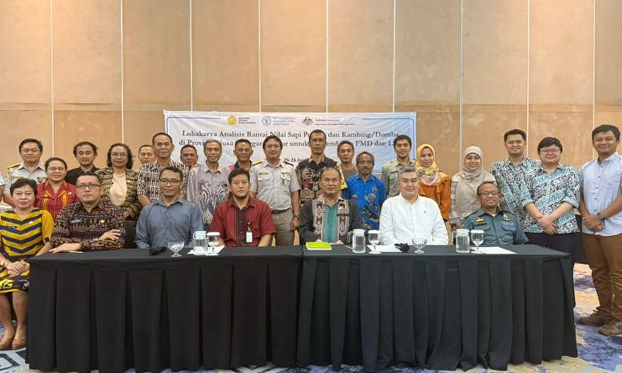 ©FAO/Dian Tarigan | INDONESIA Value chain analysis for FMD-LSD management From 25 to 26 April 2024, MoA, FAO and the Australian government conducted a beef cattle and swine value chain analysis for foot-and-mouth disease (FMD) and lumpy skin disease (LSD) management workshop in Kupang. Participants included academic and government professionals from province and the Disease Investigation Centre Denpasar. The workshop produced a livestock value chain map, assessed trade dynamics, identified risk hotspots and potential for FMD-LSD introduction pathways and assessed associated risks based on disease prevalence in surrounding areas. |
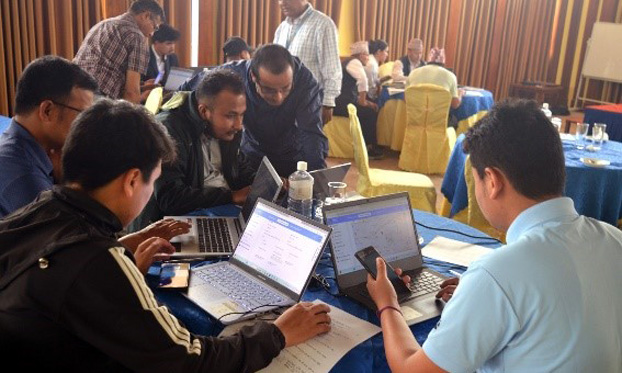 ©FAO/Surendra Karki | NEPAL Training on web-based National Animal Health Information System for epidemiological reporting FAO, with funding from USAID, conducted a training session on the National Animal Health Information System (NAHIS) for epidemiological reporting. Held from 26 to 30 April 2024, he training oriented 69 animal health professionals from Kathmandu, Bhaktapur, Lalitpur, Dhading, Sindhupalchowk, Nuwakot and Rasuwa districts. Organized in collaboration with the Department of Livestock Services and Directorate of Livestock and Fisheries Development in Bagamati province, the training provided hands-on practice with the NAHIS platform for data reporting. |
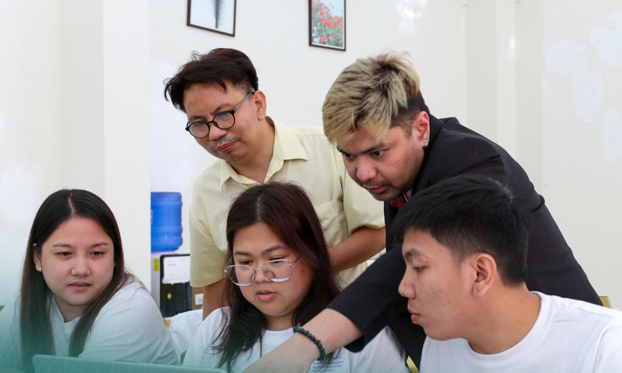 ©FAO/BAI National ASF Prevention and Control Program (NASFPCP) | THE PHILIPPINES Veterinary epidemiology and African swine fever preparedness workshop FAO, in collaboration with the Bureau of Animal Industry (BAI) and Philippine College of Veterinary Epidemiologists (PCVE), conducted the Applied Veterinary Epidemiology Training (AVET) and African swine fever (ASF) preparedness workshop in Bauang, La Union. Sixteen local government veterinarians participated, enhancing their skills in veterinary epidemiology for disease prevention and outbreak response. The workshop, supported by USAID, aimed to strengthen local capacities in managing animal health crises. |
Learn more about our work on epidemiology here.
| |
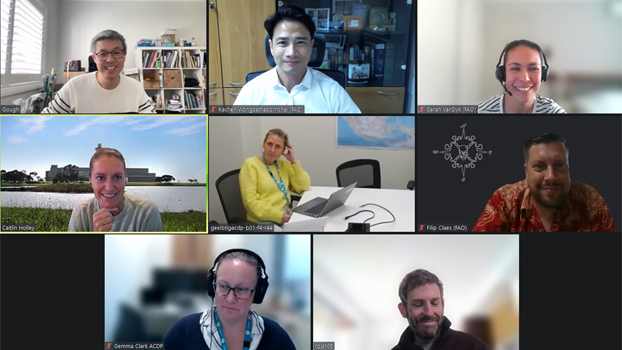 ©FAO/Kachen Wongsathapornchai | ASIA AND THE PACIFIC Discussion on laboratory capacity development support in the Pacific On 3 May 2024, FAO met with the Australian Centre for Disease Preparedness (ACDP) to strengthen collaboration on laboratory capacity development in the Pacific. FAO introduced the newly expanded Global Health Security Program in Fiji and Papua New Guinea, while ACDP outlined their ongoing efforts in these countries. FAO and ACDP discussed opportunities for collaboration, including not only laboratory activities, but also gender equality, disability, and social inclusion (GEDSI) and regional networking. Both entities will continue working closely to strengthen lab systems in Fiji and Papua New Guinea.
|
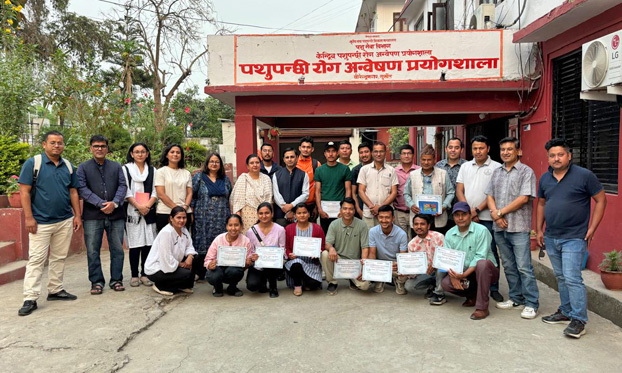 ©FAO/SURENDRA KARKI | NEPAL Biosafety and biosecurity training for veterinary laboratory staff FAO, with USAID funding, conducted a three-day biosafety and biosecurity training in veterinary laboratory in Surkhet from 22 to 24 April 2024. Fifteen staff members participated, enhancing their capacity to implement biosafety and biosecurity measures in their work. The training was organized in collaboration with DLS and Central Veterinary Laboratory.
|
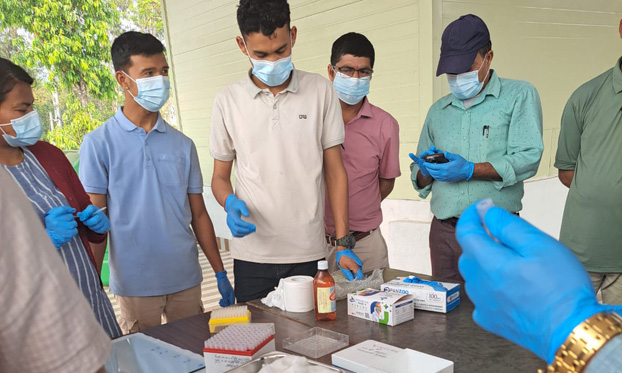 ©FAO/Surendra Karki | NEPAL Training on sample collection and epidemiological reporting FAO, through USAID funding, conducted a two–day training on sample collection, dispatch and epidemiological reporting in Surkhet between 25 and 26 April 2024. Aimed at veterinary technicians and veterinarians from Surkhet and Dailekh districts, the training focused on appropriate sample collection, packaging dispatch for disease diagnosis, including rabies, and accurate reporting. Twenty participants attended the training, organized in collaboration with the Department of Livestock Services, Ministry of Land Management, Agriculture and Cooperatives in Karnali Province and the Central Veterrinary Laboratory.
|
| Learn more about our work on capacity development of laboratory here. | |
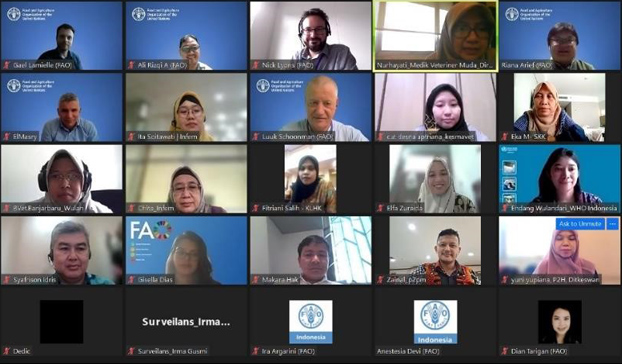 ©FAO/Riana Arief | INDONESIA Sensitization workshop on Joint Outbreak Investigation tool On 3 May 2024, MoA and FAO hosted a virtual workshop to introduce the Joint Outbreak Investigation (JOIN) too. to central government officers from the animal health, public health and wildlife health sectors. The workshop prepared the officers to use the tool for joint outbreak investigations of priority zoonotic diseases. JOIN facilitates the connection of epidemiological data from across sectors for a coordinated outbreak response. A joint ToT event is planned for the end of May.
|
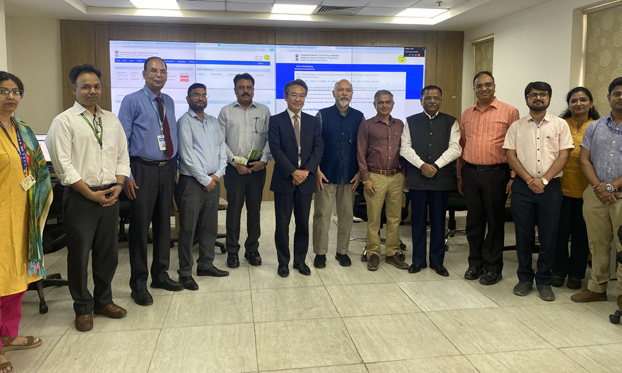 ©FAO/Rajesh Dubey | INDIA Enhancing disease surveillance through public health initiatives On 2 May 2024, FAO Representative India, Takayuki Hagiwara and WHO Representative to India, Roderico Ofrin, visited the National Centre for Disease Control (NCDC) in New Delhi. They explored NCDC’s Integrated Health Information Portal (IHIP) and Integrated Disease Surveillance Program (IDSP), including a “war room” for real-time disease updates. The IDSP is a robust surveillance program targeting outbreaks of zoonotic, communicable, and non-communicable diseases, enabling early detection and timely public health responses.
|
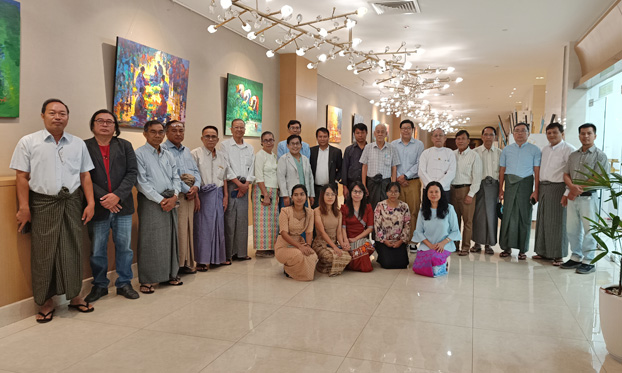 ©FAO/Win Thein | MYANMAR Workshop on disease reporting for private veterinarians FAO organized a workshop on the roles and responsibilities of private veterinarians in disease reporting in Yangon Myanmar on 29 April 2024, supported by USAID. Twenty-three veterinarians from Myanmar Veterinary Council, Myanmar Veterinary Association, Myanmar Livestock Federation, Private laboratories and clinics participated, receiving updates on emerging animal diseases and revisiting private veterinarians' roles under the 2020 Animal Health and Livestock Development Law. Participants also received a copy of Disease reporting: notes for private veterinarians in Myanmar to enhance reporting practices.
|
| Learn more about our work on surveillance here. | |
 ©FAO/Kachen Wongsathapornchai | ASIA AND THE PACIFIC REGION One Health approach to global health security The School of Global Health at Chulalongkorn University organized the Thailand Health Leadership Forum, titled “Charting the Future of Global Health: Bridging Gaps and Building Sustainability.” Participants included deans and executives of medical schools from various universities in participated. FAO ECTAD Regional Manager Kachen Wongsathapornchai presented and moderated a panel on the One Health approach towards global health security and environmental and climate change threats to global health. The event provided a platform to advocate for One Health and its contribution to global health security.
|
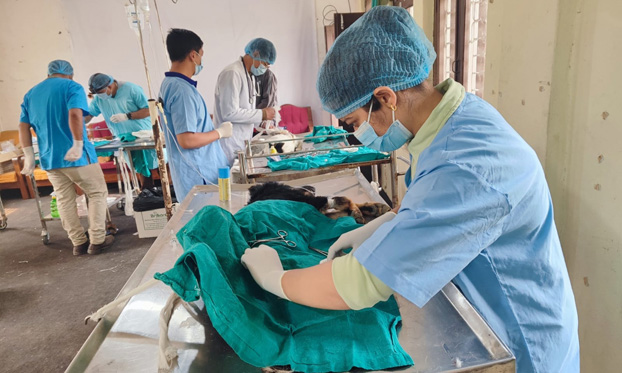 ©FAO/Surendra karki | NEPAL Animal birth control camps for rabies elimination With USAID support, FAO, Department of Livestock Services and Veterinary Hospital and Livestock Service Expert Center conducted two animal birth control camps in Tanahun, Nepal between 20 and 29 April 2024. A total of 446 community and stray dogs were sterilized and vaccinated against rabies. The initiative supports dog population management, contributing to the “Zero by 30” rabies elimination goal.
|
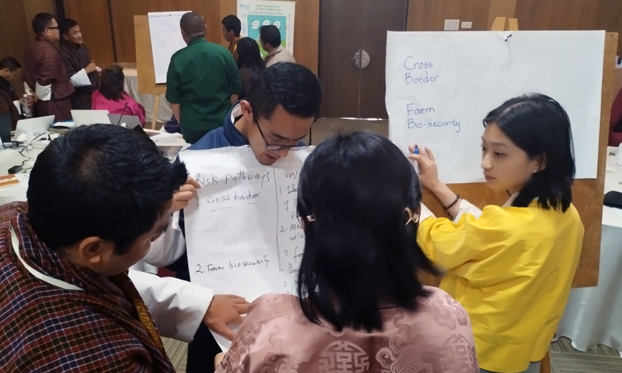 ©FAO/Yin Myo Aye | ASIA AND THE PACIFIC AND BHUTAN Enhancing One Health collaboration and training in Bhutan FAO, World Health Organization (WHO) and World Organisation for Animal Health (WOAH) facilitated workshops in Bhutan from 29 April to 4 May 2024 to strengthen One Health coordination and collaboration among all stakeholders. The One Health Disease Prioritization (OHZDP) workshop prioritized ten zoonotic diseases of greatest concern, including diseases with limited capacity in one sector and diseases without collaboration in place, and discussed joint activities for enhanced collaboration and response. Following this, training on the Joint Risk Assessment Tool (JRA OT) equipped participants from various sectors with skills to conduct joint risk assessments for two priority zoonotic diseases within 3-6 months.
|
| Learn more about our work on One Health here. | |
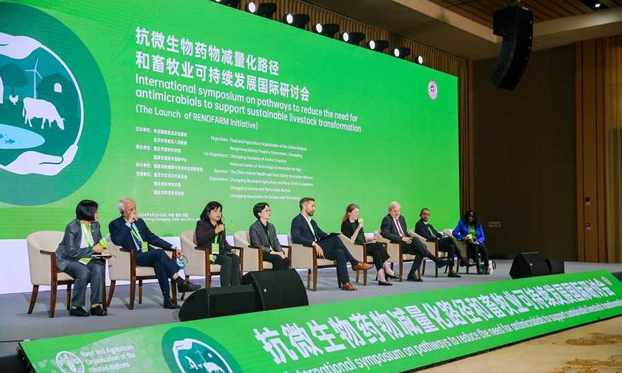 ©Indonesian Ministry of Agriculture | INDONESIA International symposium on reducing the need for antimicrobials
Between 25 and 26 April 2024, MoA participated in the International Symposium on Pathways to Reduce the Need for Antimicrobials to Support Sustainable Livestock Transformation in China. The MoA shared Indonesia’s efforts to reduce the need for antimicrobials in agri-food systems through the RENOFARM (Reducing the Need for Antimicrobials on Farms for Sustainable Agrifood System Transformation) initiative. During the symposium, FAO globally launched the RENOFARM initiative, outlining its goals to Member Nations and partners. |
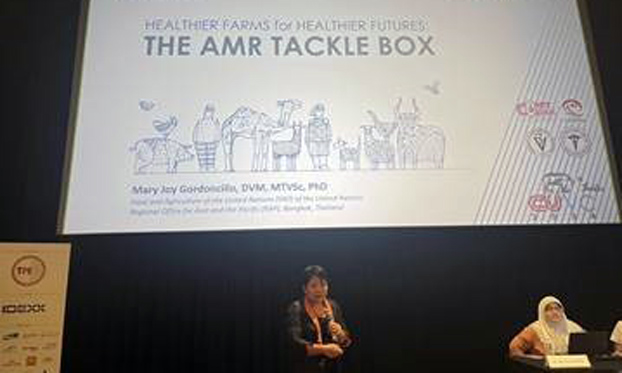 ©FAO/Mary Joy Gordoncillo | ASIA AND THE PACIFIC Introduction of the AMR tackle box and the AMR pledge campaign
On 25 April 2024, FAO took part at the Chulalongkorn University Veterinary Conference technical sessions entitled “Healthy pigs, healthy farms healthy futures.” FAO introduced the ongoing initiatives of the AMR tackle box, a virtual platform with resources for veterinarians to improve practices and promote responsible antimicrobial use. The platform supports the AMR pledge campaign, initiated with the Federation of Asian Veterinary Association, encouraging veterinarians to commit to AMR mitigation. |
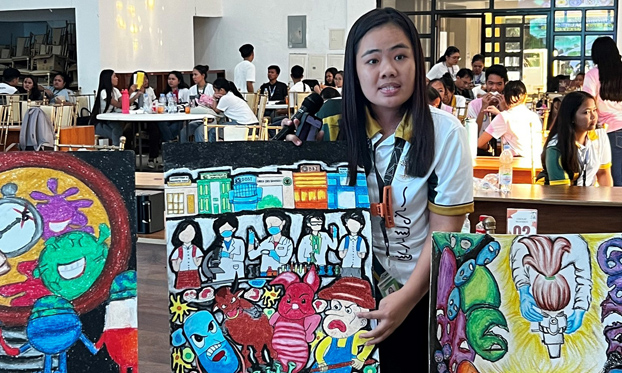 ©FAO/Ethel Yap | THE PHILIPPINES Students’ forum on AMR and food safety
FAO, funded by Fleming Fund and in collaboration with BAI and Isabela State University (ISU), conducted a students’ forum on AMR and food safety. The event aimed to increase students’ awareness on AMR and government food safety initiatives. It covered topics such as the Philippine National Action Plan on AMR, related laws and regulations, and the prudent use of antimicrobials. Attendees included students and faculty from veterinary medicine, agriculture and allied medical fields. |
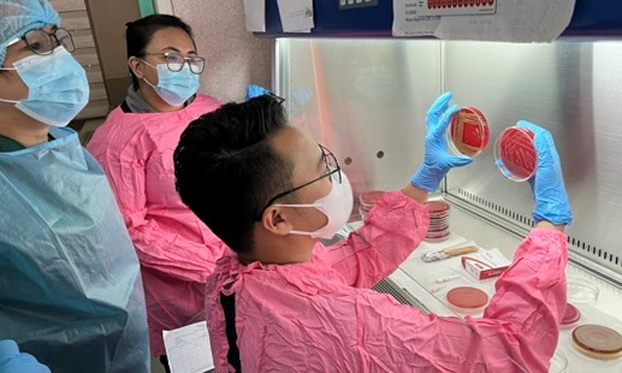 ©FAO/Ralph Carolyn Cabug | THE PHILIPPINES Training to harmonize bacteriological procedures
Through Fleming Fund funding, FAO and BAI conducted a refresher training and parallel testing on bacterial isolation, identification and antimicrobial susceptibility testing (AST) at the Regional Animal Disease Diagnostic Laboratory (RADDL) Region XIII. This initiative aimed to standardize procedures across RADDLs in the Philippines, essential for future nationwide AMR surveillance activities. |
Learn more about our work on AMR here.
| |
